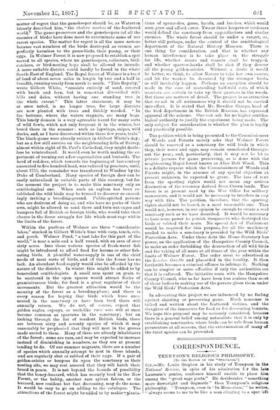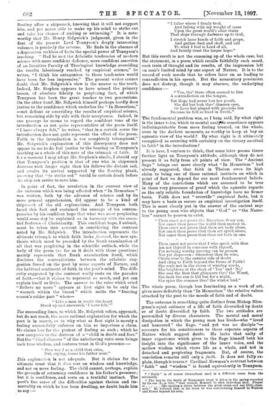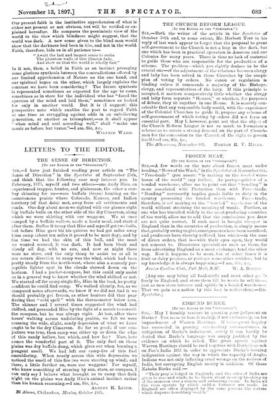CORRESPONDENCE.
TENNYSON'S RELIGIOUS PHILOSOPHY.
[TO THE EDITOR 07 THE " SPECTLIOR."]
SIE,-Mr. Leslie Stephen in his study of Tennyson in the National Review, in spite of his admiration fu., the late Laureate's genius, confesses himself unable to place him among the "great sage poets." He desiderates "something more downright and dogmatic" than Tennyson's religious philosophy. "Tennyson, even in In Memoriam,'" he writes, "always seems to me to be like a man clinging to a spar left
floating after a shipwreck, knowing that it will not support him, and yet never able to make up his mind to strike out and take his chance of sinking or swimming." It is note- worthy that Mr. Henry Sidgwick's judgment, given in the first of the present Lord Tennyson's deeply interesting volumes, is precisely the reverse. He finds in the absence of a dogmatism reckless of facts the special power of Tennyson's teaching. "Had he met the Atheistic tendencies of modern science with more confident defiance, more confident assertion of an Intuitive Faculty of Theological knowledge overriding the results laboriously reached by empirical science," he writes, "I think his antagonism to these tendencies would have been far less impressive." The present writer cannot doubt that Mr. Sidgwick's view is the nearer to the truth.
Indeed, Mr. Stephen appears to have missed the primary lesson, of absolute fidelity to perplexing fact, of which Tennyson has been the great teacher to two generations. On the other hand, Mr. Sidgwick himself perhaps hardly does justice to the confidence which underlies the "In Memoriam," —not defiant or overriding the results of empirical science, but remaining side by side with their acceptance. Indeed, in one passage he seems to regard the confident tone of the introduction as not quite representative of the poem itself. "I have always felt," he writes, "that in a certain sense the introduction does not quite represent the effect of the poem. Faith in the introduction is too completely triumphant." Mr. Sidgwick's explanation of this discrepancy does not appear to me to do full justice to the bearing on Tennyson's teaching as a whole of this note of the triumph of faith. If r a moment I may adopt Mr. Stephen's simile, I should say that Tennyson's position is that of one who in shipwreck discerns with longer sight than his fellows the distant sail, and awaits its arrival supported by the floating plank, knowing that "to strike out" would be certain death before :he ship can arrive to save him.
In point of fact, the revolution in the current view of the universe which was being effected when "In Memoriam" was written, both by the advance of science and by its
more general apprehension, did appear to be a kind of shipwreck of the old explanations. And Tennyson both faced this fact and sustained the courage of his contem- poraries by his confident hope that what was most perplexing would some day be explained as in harmony with the essen- tial features of Christianity. This confident hope, I submit, must be taken into account in considering the contrast noted by Mr. Sidgwick. The introduction represents the ultimate triumph to which faith looks forward, the new syn-
thesis which must be preceded by the frank examination of
all that was perplexing in the scientific outlook, while the body of the poem (so far as it deals with these questions) mainly represents that frank examination itself, which discloses the contradictions between the atheistic sug-
gestion forced on the poet by some aspects of Nature, and the habitual sentiment of faith in the poet's mind. The diffi- culty suggested by the contrast really rests on the paradox of faith,—that it claims to represent so much, and yet can explain itself so little. The answer to the voice which cried "Believe no more" appears at first sight to be only the "warmth within the breast" which melts the "freezing reason's colder part" when-
" Like a man in wrath the heart Stood up and answered, 'I have felt:" The succeeding lines, to which Mr. Sidgwick refers, approach, but do not reach, the more rational explanation for which the poet is in search, as to why what at first sight is merely a feeling successfully enforces on him so imperious a claim. He claims less for the protest of feeling as such ; which he now compares to the distress of a child in doubt and fear."
But the "blind clamour" of the unbelieving voice soon brings back true wisdom, and restores trust in God's presence :—
"Then was I as a child that cries, But, crying, knows his father near."
This explanation is not adequate. But it claims for the
ultimate trust that it does rest on wisdom and knowledge, and not on mere feeling. The child cannot, perhaps, explain the grounds of returning confidence in his father's presence ; but it is confidence, and rests on a truthful instinct. The poet's fine sense of the difficulties against theism and im- mortality on which he has been dwelling, no doubt leads him to say :—
"I falter where I firmly trod, And falling with my weight of cares Upon the great world's altar stairs That slope through darkness up to God, I stretch lame hands of faith and grope, And gather dust and chaff, and call To what I feel is Lord of all,
And faintly trust the larger hope."
But this result is not the summing up of the whole case, but the statement, in a poem which recalls faithfully each mood, each train of thought and its results, of the impression left on man's limited mind by one aspect of Nature. It is to the record of such moods that he refers later on as leading to contradiction in his speech. But the momentary pessimism does not destroy, though it may obscure, the underlying confidence :—
"Yea, tho' there often seemed to live A contradiction on the tongue, Yet Hope had never lost her youth.
She did but look thro' dimmer eyes,
Or Love but played with gracious lies
Because he felt so fixed in Truth."
The fundamental problem was, as I have said, By what right is the inner voice, which to mental analpis sometimes appears indistinguishable from mere feeling trusted, on the whole, even in the darkest moments, as worthy to keep at bay an agnostic view of the world ? By what right is it ultimately
recognised as counting with certainty on the victory ascribed to faith* in the introduction ?
It is here, I venture to think, that some later poems throw further light on Tennyson's attitude, although they do not present it as fully from all points of view. The "Ancient Sage" brings out more clearly what "In Memoriam" had already suggested, that faith in Theism owes its high claim to being one of those rational instincts on which in point of fact we depend for our most fundamental beliefs Manyof the convictions which are assumed to be true in those very processes of proof which the agnostic regards as the only reliable foundation of knowledge have no firmer basis. Faith does not " override " empirical facts, but it may have a basis as secure as empirical investigation itself.
This is most clearly put in the answer of the ancient sage to the young man who objects that "God" or "the Name- less" cannot be proven to exist.
"Thou canst not prove the Nameless, 0 my son, Nor canst thou prove the world thou movest in. Thou canst not prove that thou art body alone, Nor canst thou prove that thou art spirit alone, Nor canst thou prove that thou art both in one.
Thou canst not prove that I who speak with thee Am not thyself in converse with thyself, For nothing worthy proving can be proven Nor yet disproven : wherefore then be wise, Cleave ever to the sunnier side of doubt And cling to Faith beyond the forms of Faith ! She reels not in the storm of warring words, She brightens at the clash of 'Yes' and No,' She sees the Best that glimmers thro' the Worst, She feels the sun is hid but for a night, She spies the summer thro' the winter bud."
The whole poem, though less fascinating as a work of art, gives more definitely than "In Memoriam" the relative values attached by the poet to the moods of faith and of doubt.
The outcome is something quite distinct from Bishop Blou- gram's equal estimate of a life of faith diversified by doubt or of doubt diversified by faith. The two attitudes are personified by diverse characters. The mental and moral dissipation in which the young man has lived—who "loved and honoured" the Sage, "and yet was no disciple "— accounts for his sensitiveness to those separate aspects of Nature which suggest doubt. He lacks that unity of inner experience which gives to the Sage himself both his
insight into the significance of the inner voice, and the mellow wisdom which views life as a whole, and not in detached and perplexing fragments. But, of course, the conviction remains still only a faith. It does not fully ex-
plain, though it trusts.t Cardinal Newman's contrast between " faith " and "wisdom" is found equivalently in Tennyson.
• "Faith" is of course throughout used in a different sense from the scholastic. t The key to the depth of Tennyson's trust is given in the saying recorded by his son p. 324), "God reveals Himself to each individual soul. Prayer
is like opening a sluice between the great ocean and our little chan- nels." He believed that in his trust he was surrendering himself to Wisdom and Power beyond his own. Our present faith is the instinctive apprehension of what is either not present or not obvious, but will be verified or ex- plained hereafter. He compares the pessimistic view of the world to the view which blindness might suggest, that the world was dark. A new sense given to the blind man would show that the darkness had been in hint, and not in the world. Faith, therefore, bids us in all patience to— 'Await the last and largest sense to make
The phantom walls of this illusion fade, And show us that the world is wholly fair."
Es it not, then, a belief in Faith as an instinct presaging some glorious synthesis between the contradictions offered by our limited apprehension of Nature on the one hand, and our spiritual hopes on the other, which largely explains the contrast we have been considering ? The future synthesis is represented sometimes as expected for the age to come, sometimes as in store for the individual who has "faced the spectres of the mind and laid them," sometimes as looked for only in another world. But it is (I suggest) this prospective note which enables the poet to regard Faith at one time as struggling against odds in an unbelieving generation, at another as triumphant,—as it shall appear
when mind and soul according well," shall "make one music as before, but vaster."—I am, Sir, &c., WILFRID WARD.








































 Previous page
Previous page